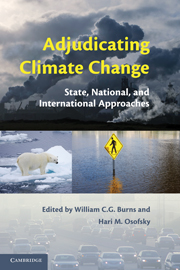Book contents
- Frontmatter
- Contents
- Foreword
- Acknowledgments
- Adjudicating Climate Change
- 1 Overview: The Exigencies That Drive Potential Causes of Action for Climate Change
- PART I SUBNATIONAL CASE STUDIES
- PART II NATIONAL CASE STUDIES
- 6 The Intersection of Scale, Science, and Law in Massachusetts v. EPA
- 7 Biodiversity, Global Warming, and the United States Endangered Species Act: The Role of Domestic Wildlife Law in Addressing Greenhouse Gas Emissions
- 8 An Emerging Human Right to Security from Climate Change: The Case Against Gas Flaring in Nigeria
- 9 Tort-Based Climate Litigation
- 10 Insurance and Climate Change Litigation
- PART III SUPRANATIONAL CASE STUDIES
- 17 Conclusion: Adjudicating Climate Change across Scales
- Index
- References
9 - Tort-Based Climate Litigation
Published online by Cambridge University Press: 25 August 2009
- Frontmatter
- Contents
- Foreword
- Acknowledgments
- Adjudicating Climate Change
- 1 Overview: The Exigencies That Drive Potential Causes of Action for Climate Change
- PART I SUBNATIONAL CASE STUDIES
- PART II NATIONAL CASE STUDIES
- 6 The Intersection of Scale, Science, and Law in Massachusetts v. EPA
- 7 Biodiversity, Global Warming, and the United States Endangered Species Act: The Role of Domestic Wildlife Law in Addressing Greenhouse Gas Emissions
- 8 An Emerging Human Right to Security from Climate Change: The Case Against Gas Flaring in Nigeria
- 9 Tort-Based Climate Litigation
- 10 Insurance and Climate Change Litigation
- PART III SUPRANATIONAL CASE STUDIES
- 17 Conclusion: Adjudicating Climate Change across Scales
- Index
- References
Summary
INTRODUCTION
Discussions about how to address climate change usually focus on politics, policies, and programs. Until recently, the potential role of climate change litigation had been virtually ignored. But in the past few years, the idea of using litigation as a tool to address the causes and impacts of climate change has picked up steam, as illustrated in many chapters of this book. Perceiving a lack of meaningful political action – and given the increasing scientific evidence that “[m]ost of the observed increase in global average temperatures since the mid-20th century is very likely [greater than 90% likelihood] due to the observed increase in anthropogenic greenhouse gas concentrations” – lawyers around the world have begun exploring litigation strategies and, in some cases, initiating actions. This chapter evaluates the viability of one type of climate change litigation – what some see as the most novel or radical idea – namely, applying tort law to hold companies emitting substantial amounts of greenhouse gases liable for at least some of the harms caused by climate change.
There are those who argue that it is not useful to pursue such climate change claims in the courts. But harm caused by human activity is a central concern of tort law, and many of climate change's costs are harms produced at least partially as a result of human actions. Further, because of the uneven nature and distribution of the effects of climate change, some localized groups (e.g., those living in coastal areas or at high latitudes) are bearing, and will continue to bear, the brunt of climate change's harms and costs.
- Type
- Chapter
- Information
- Adjudicating Climate ChangeState, National, and International Approaches, pp. 193 - 229Publisher: Cambridge University PressPrint publication year: 2009
References
- 6
- Cited by



